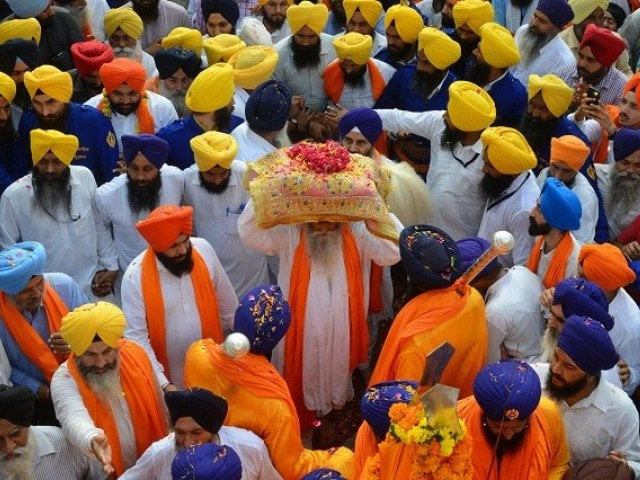Sikh pilgrims arrive for pilgrimage
Focal point of Baisakhi celebrations will start today at Gurdwara Panja Saheb Hasanabdal

At least 2,475 Sikh pilgrims arrived in Pakistan from India through Wagah border to commemorate Khalsa Janam Din and partake in the festivities of Baisakhi Mela on Saturday.
The Indian Sikh pilgrims were greeted as they step onto Pakistani soil. The focal point of the Baisakhi celebrations will start today (April 14) at the Gurdwara Panja Saheb Hasanabdal.
Pakistan has extended visas to 2,843 Indian Sikh pilgrims, granting them the opportunity to engage in the festivities of Baisakhi Mela and Khalsa Janam Din.
Speaking to The Express Tribune, Rana Shahid, the additional secretary of the evacuee trust property board, shared that following customs clearance and immigration procedures at the Wagah border, the pilgrims will be transported to Hasanabdal via a special train.
There, they will partake in the main event of Baisakhi Mela slated for April 14 at the Gurudwara Panja Saheb.
Subsequently, on April 15, the pilgrims will journey to Nankana Sahib from Hasanabdal, where they will pay homage at Sacha Sauda (Farooqabad) during their stay. This will be followed by a visit to Gurudwara Darbar Sahib Kartarpur (Narowal) on April 18.
The pilgrimage will continue with a visit to Gurudwara Rori Sahib (Eminabad) on April 20, where the pilgrims will spend a day in contemplation.
The culmination of the spiritual journey will see the Sikh pilgrims bidding farewell to Pakistan on April 22, marking the completion of their 10-day pilgrimage.
Sardar Ramesh Singh, the head of the Pakistan Sikh Gurdwara Parbandhak Committee and provincial minister for minority affairs in Punjab, said that Basakhi and Khalsa Janam Day are distinct festivals.
He recounted the historical significance of Baisakhi, stating that on this day in 1699, the tenth Guru Gobind Ji founded the Sikh Panth at Anandpur Sahib.
Guru Gobind Ji mandated the Khalsa Sikhs to embrace the five articles of faith, including ‘kesh’ (unshorn hair and beard), ‘kangha’ (a wooden comb), ‘kara’ (a bracelet), ‘kachera’ (an undergarment), and ‘kirpan’ (a small curved sword or knife).



















COMMENTS
Comments are moderated and generally will be posted if they are on-topic and not abusive.
For more information, please see our Comments FAQ